
Cursor AI vs IntelliCode: What Sets These AI Coding Assistants Apart?
Discover the key differences between Cursor AI and IntelliCode in this in-depth 2025 guide. Explore features, architecture, language support, performance, and real-world use cases to choose the right AI coding assistant for your development workflow.
AI ASSISTANTAI/FUTUREPROGRAMMINGEDUCATION/KNOWLEDGE
Sachin K Chaurasiya
4/20/20255 min read
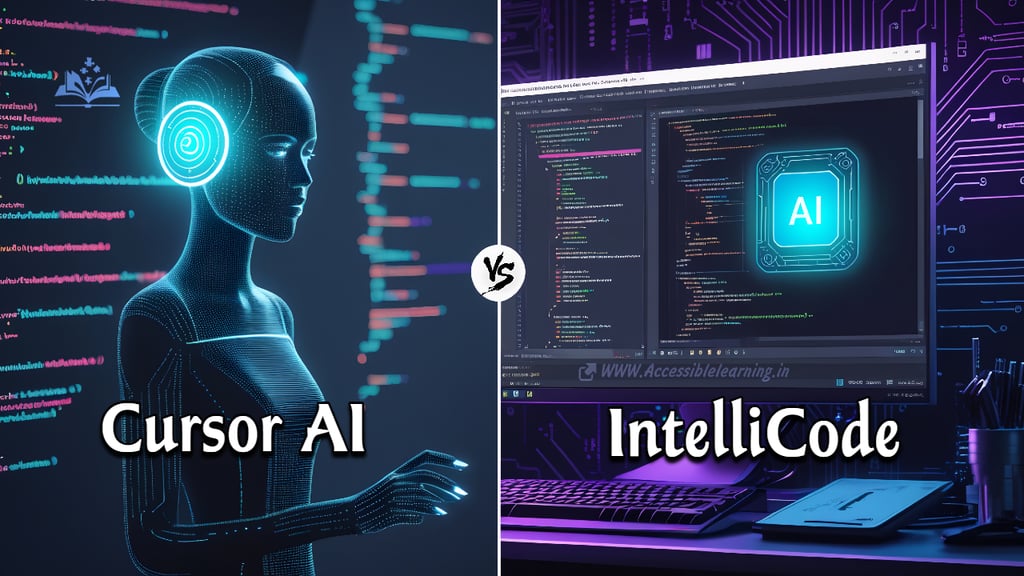

As artificial intelligence becomes an inseparable part of the software development process, developers are constantly seeking tools that can enhance productivity, reduce repetitive tasks, and provide smarter code suggestions. Two prominent players in this arena are Cursor AI and Visual Studio IntelliCode. While both serve similar goals—supercharging the developer experience—they come from different philosophies and offer distinct features.
Let’s dive into a detailed comparison between Cursor AI and IntelliCode, uncovering which tool fits better depending on your workflow, project size, and personal preferences.
What is Cursor AI?
Cursor AI is a cutting-edge, AI-powered code editor built from the ground up with AI at its core. Think of it as the ChatGPT of code editors. Cursor uses OpenAI’s Codex and GPT-based models to help you write, refactor, debug, and understand code seamlessly inside an editor.
Key Features
ChatGPT-like assistant inside the IDE
You can have natural language conversations with the AI, and it understands the context of your entire codebase.
AI-Powered Codebase Navigation
Cursor allows you to ask questions like “Where is the payment logic handled?” and it will jump to the right file or function.
Refactor with Intelligence
It supports natural language-based refactoring. For example, you can type “Convert this function to async,” and it does it instantly.
Multi-language Support
Cursor isn’t just limited to one language—whether it's Python, JavaScript, TypeScript, or even Go, it adapts intelligently.
Collaborative Workflow
Ideal for startups, remote teams, or solo developers working on large-scale applications who want to accelerate coding speed.
VS Code Compatible
Cursor is a fork of VS Code, which means you can install most VS Code extensions and feel right at home.
How Cursor AI Works
Cursor acts like a full-time AI pair programmer that understands
Your current project files
Your coding patterns
Your development goals (thanks to natural language queries)
You can ask things like
“What does this function do?”
“Refactor this to reduce time complexity.”
“Add error handling to this API call.”
Deep Features
Command Palette + ChatGPT Integration
You can use prompt commands or chat naturally in a sidebar to get help or trigger actions.Explain Code and Documentation Generation
Cursor can write comments, generate README sections, or auto-document classes/functions.Bug Fixing by Prompt
Simply type “fix this bug,” and the AI analyzes the error and corrects it.Codebase Search Using Questions
Instead of guessing filenames or using Ctrl+F, ask Cursor AI, “Where do we calculate discounts?”Code Completion + Semantic Suggestions
It doesn’t just match keywords—it understands intent.Git Integration
Auto-generates commit messages based on code changes and even summarizes pull requests.
Real-World Use Cases
Solo developers & indie hackers needing rapid MVPs.
AI engineers building GPT-powered apps, LLM wrappers, or plugins.
Startups that pivot fast and rely on auto-refactoring and fast debugging.
Code educators or students needing explanations and mentorship-like assistance.
Limitations
Requires internet connectivity for AI responses.
Heavy reliance on OpenAI APIs may have cost implications at scale.
New tool—might lack some traditional VS Code polish/features.
Not ideal for legacy codebases with highly specialized environments.


What is IntelliCode?
IntelliCode is Microsoft’s AI-powered code suggestion system integrated into Visual Studio and VS Code. It's designed to enhance rather than replace the traditional development experience by giving smart, context-aware suggestions based on best practices learned from analyzing thousands of open-source projects on GitHub.
Key Features
AI-Assisted IntelliSense
IntelliCode enhances traditional IntelliSense by ranking suggestions based on usage patterns across GitHub projects and your own code.
Custom Model Training
Developers can train IntelliCode on their codebase to fine-tune suggestions tailored to their style and libraries.
Team Code Style Recommendations
It learns from team coding practices and enforces consistency in suggestions.
Supports Multiple Languages
IntelliCode works with C#, C++, JavaScript, TypeScript, Python, and XAML.
Seamless Integration in Visual Studio
Ideal for developers deeply embedded in the Microsoft ecosystem.
How IntelliCode Works
IntelliCode builds on IntelliSense by prioritizing suggestions using
Project context
Best practices from GitHub
Your own coding history
Unlike Cursor, it’s non-intrusive. It doesn’t initiate actions but quietly assists.
Highlighted Features
Top Suggestions with Star Indicators
IntelliCode highlights “smart” completions with stars based on frequency and context.Team Training
You can train IntelliCode on your team’s repositories to reflect internal coding styles and naming conventions.Custom Models
Available through GitHub or Azure DevOps, this lets enterprises get personalized AI suggestions.Code Formatting & Consistency
Ensures your entire team follows uniform patterns in function naming, braces, spacing, etc.IDE Native Tools
IntelliCode fits right into the Visual Studio ecosystem, including integration with other Microsoft tools like Azure, Live Share, and DevOps.
Real-World Use Cases
Enterprise teams with large, regulated codebases.
.NET or C# developers deeply entrenched in Microsoft’s tools.
Long-term projects where coding standards and code history are key.
Dev teams are using Azure Pipelines or GitHub Actions.
Limitations
Not conversational—you can’t “ask questions” like you can in Cursor.
Doesn’t understand complex code semantics deeply like GPT models do.
No built-in debugging assistant—limited to smart suggestions.
Limited interaction with codebase questions (no natural queries like “what does this function do?”)
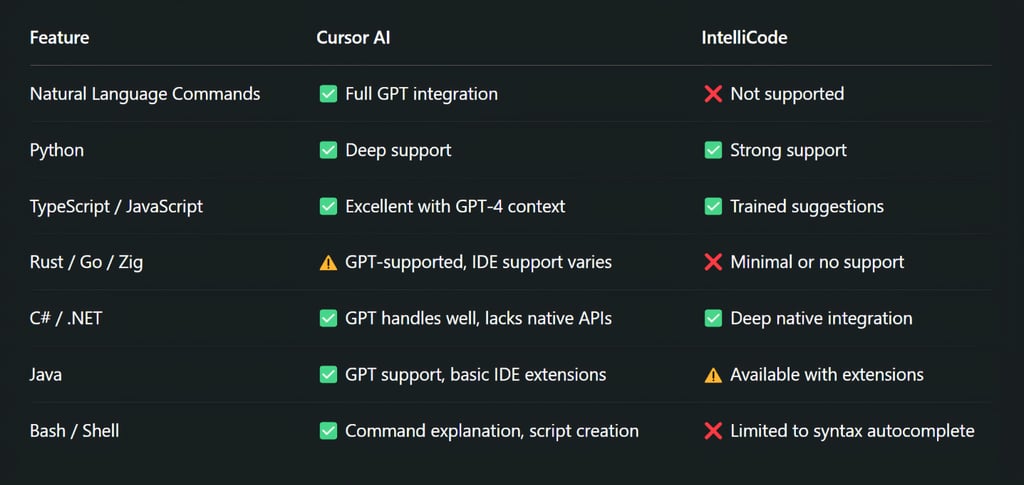

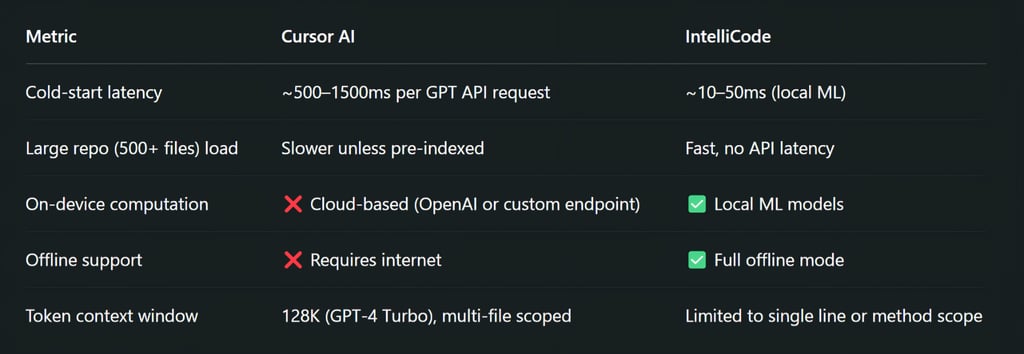

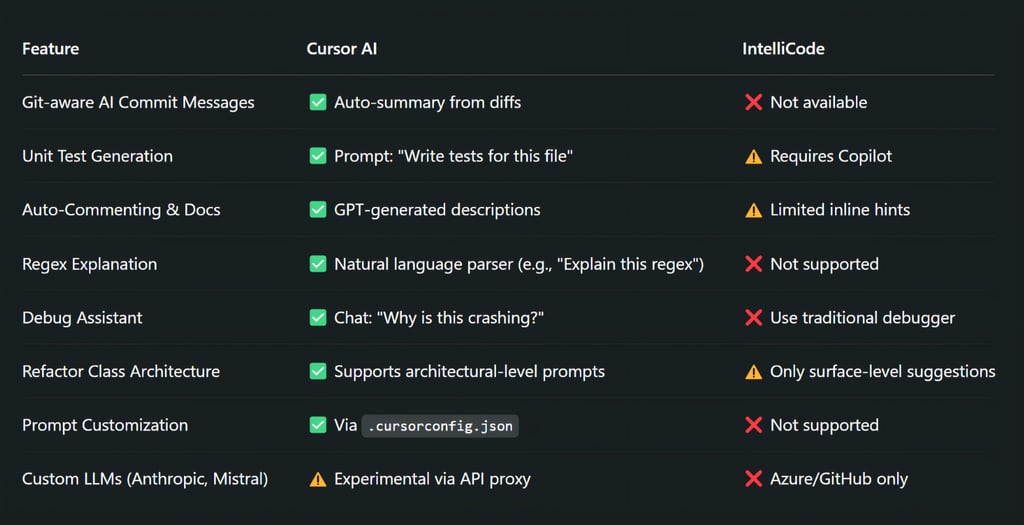

Performance & Speed
Cursor AI can slow down slightly on large repositories if not optimized due to real-time API calls to OpenAI.
IntelliCode performs with minimal lag since it processes everything locally or in your IDE context (especially when models are pre-trained).
Security & Privacy
Cursor AI: Data may be sent to OpenAI servers unless self-hosted. API key scoping & telemetry control available via config.
IntelliCode: Fully local execution unless using Azure-based training. Custom models stored in private cloud or on-prem.
For compliance-heavy industries (HIPAA, finance, etc.), IntelliCode wins by supporting full offline usage and on-prem model training.
The Future: Where Are They Heading?
Cursor AI Roadmap
Multi-agent collaboration (voice+AI pair)
Integrated test coverage visualization
Open weight LLM support (via Hugging Face + local LLMs)
Plugin store for AI agents (e.g., "TestBot," "RefactorBot")
IntelliCode Roadmap
Deeper GitHub Copilot Studio integration
Architectural pattern detection (anti-pattern alerts)
Azure-native recommendations (cost, scaling, telemetry)
LLM-enhanced IntelliSense vNext
Cursor AI brings the magic of LLMs into your IDE with intelligence that feels almost human—it explains, writes, fixes, and reasons across your entire codebase.
IntelliCode, meanwhile, is your silent but wise coding assistant, quietly optimizing and auto-completing your way to better code without breaking flow or demanding the cloud.
In 2025, both tools will likely converge in capability. But your current workflow, tech stack, and team structure should guide your choice today.
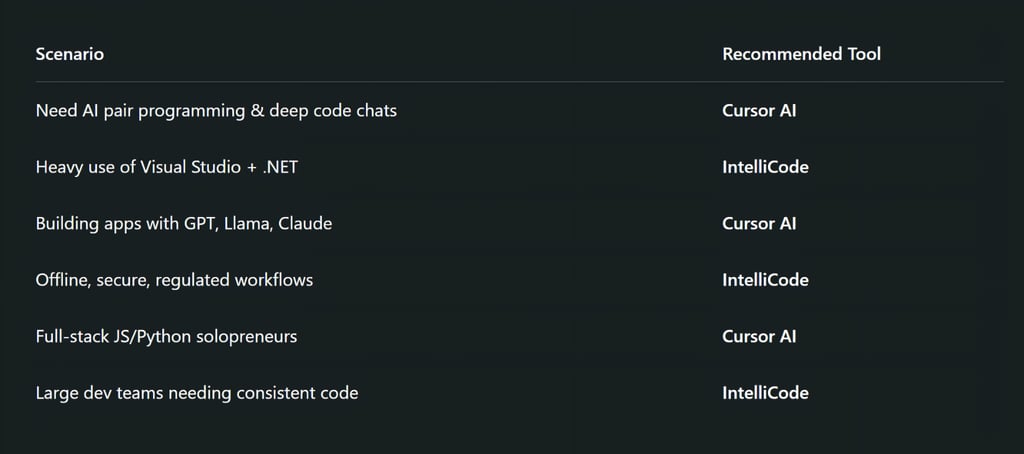

Subscribe To Our Newsletter
All © Copyright reserved by Accessible-Learning Hub
| Terms & Conditions
Knowledge is power. Learn with Us. 📚


